“], “filter”: { “nextExceptions”: “img, blockquote, div”, “nextContainsExceptions”: “img, blockquote, a.btn, a.o-button”} }”>
You’ve heard the advice for better sleep. No caffeine. Put your phone down. Create a nighttime ritual. Yet sometimes that’s simply not enough.
One of the reasons that many of us find it difficult to sleep lately is our inability to take ourselves out of fight-or-flight or sympathetic nervous system response. The state of being constantly on alert seems to accompany daily existence lately, whether we fall into doomscrolling, worry about the escalating price of gas and groceries, or constantly feel like we’re inundated at work.
This state of constant anxiety results in a cascade of physiological changes, including psychological and physical tension that require more of an antidote than a cup of chamomile tea.
Research shows that slowing your breathing for as little as six long, sustained inhalations and exhalations can counteract overwhelm. But sometimes it’s not easy to simply sit there and breathe. Syncing your body with your breath as you take yourself through some soothing yoga poses allows you to divert your attention from ruminating on the state of the world and back to the moment at hand, which is the only place life—and sleep—happen.
8 yoga poses for better sleep
Even a few minutes of slow movement through simple yoga poses can help you settle back into your calmer self and unwind.
Cat and Cow
For Cow Pose, inhale and tip your hip points down, widening your sit bones. Dip down into your belly and open through your chest. For Cat Pose, exhale, curl your chin in and use your exhale to lift your navel in and up. Press into your hands and feel some space between your shoulder blades as your upper spine domes. Your spine arches tail-to-crown, like an angry cat.
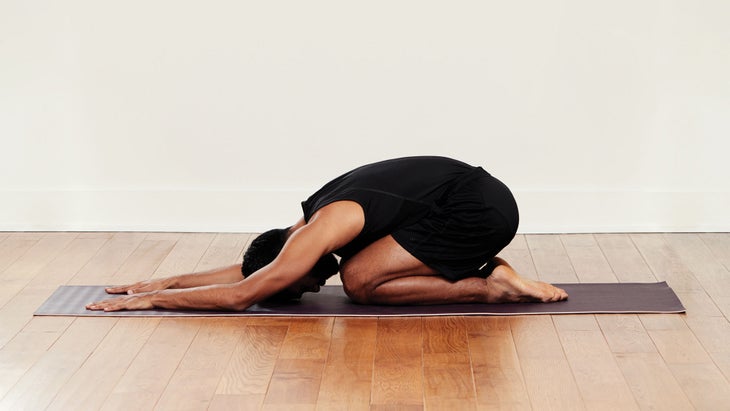
Child’s Pose
With your knees together or apart, sit back on your feet in a kneeling position and then lean forward, allowing your torso to rest on your thighs and your forehead on the floor. Rest your head on the ground and your arms in front of you with your forearms grounded. Allow yourself to feel cocooned and safe within the shape. Focus on the release: let go and surrender to the downward flow of gravity.
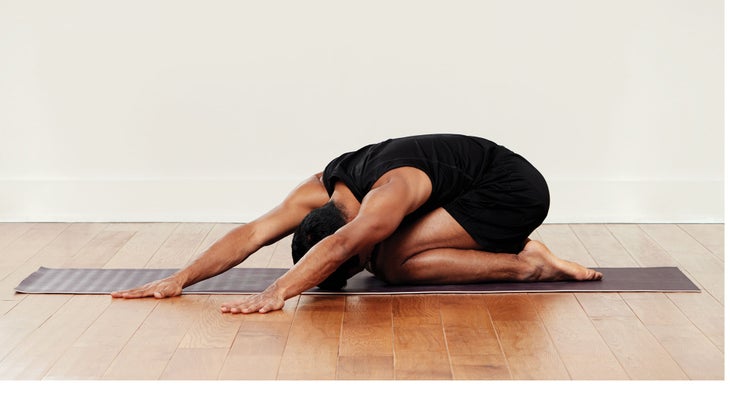
Child’s Pose: Diagonal Stretch
From Child’s Pose, walk your hands over to one side, reaching your second hand as far away from you as possible. This lateral extension allows you to breathe a bit deeper into your side body, and it’s a welcome side stretch if you’ve been at a desk all week. Take five breaths on one side and repeat on the other side. Bring your hands back to center.
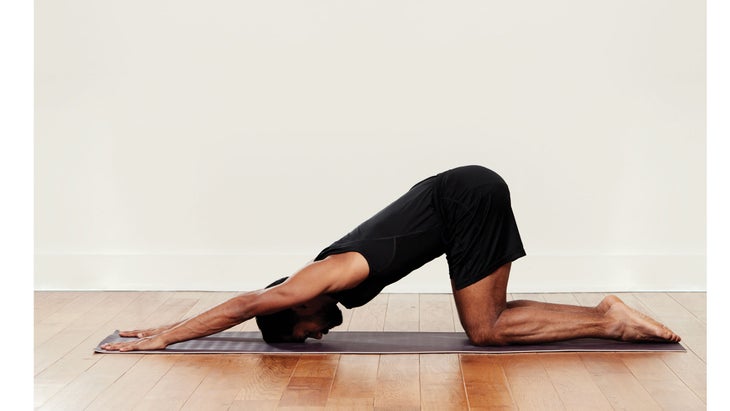
Extended Puppy Pose
From Child’s Pose, slowly walk your hands forward. Your hips stay above your knees as you walk your hands further away, so that you feel an opening in your underarms. Keep your elbows off the floor and rest your forehead to the ground. Maintain length in your spine and extension all the way to your fingertips. Imagine your arms starting at your hips and creep your ribs away from your pelvis to feel side body length. Come back to hands and knees.
See also 4 Ways To Modify Extended Puppy Pose
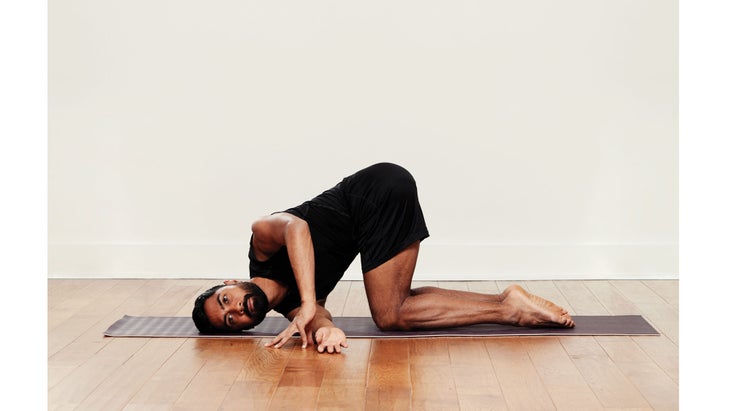
Revolved Child’s Pose
From all fours, with your shoulders over your wrists and keeping your thighs perpendicular to the floor, thread your right arm underneath your left arm until you’re lying on your shoulder. Rest your right arm on the ground from your shoulder all the way to the back of your hand. Turn your head so that your temple rests on the ground. Revolve your chest and ribcage so they turn towards your arm and into a twist. Use your exhale to twist a little deeper. Press back through your right palm and unravel the way you came in. Repeat on the other side.
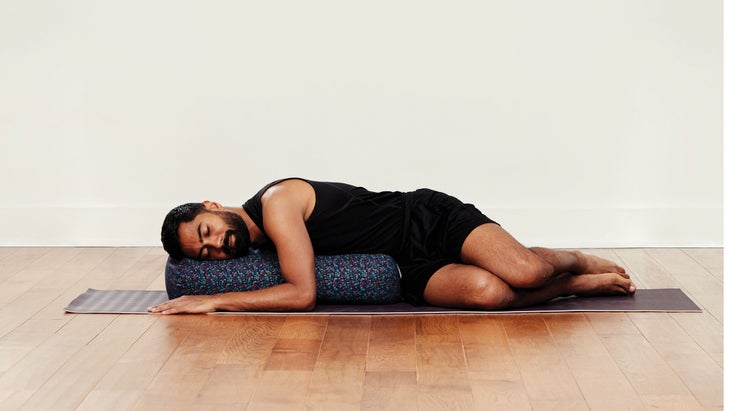
Side Lying Spinal Twist
Place a bolster lengthways along the center of the mat and kneel next to it with your right hip touching the short side of the bolster. From here, turn your torso towards the bolster, keeping your knees to the side and your hip snug to the bolster. Inhale, creating space and length in your torso. Exhale, lay your belly down on the bolster. Place your face down sideways, looking in the same direction as your knees. You can experiment with a blanket supporting your head. Give yourself time soften into your props. Repeat on other side.
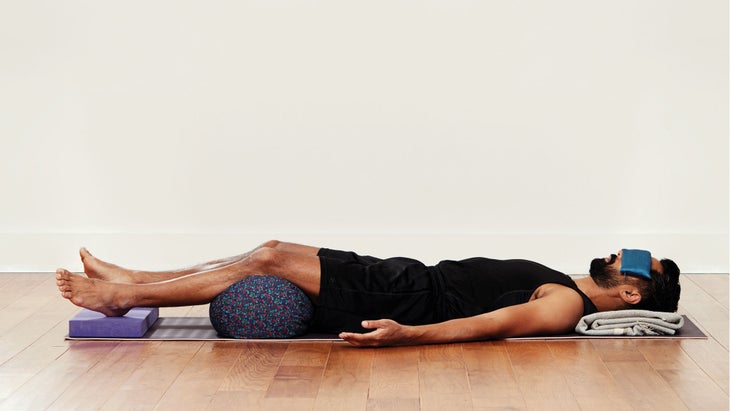
Make yourself as comfortable as possible lying on your back. Make sure you’re warm enough. Maybe put a bolster or a couple pillows underneath your knees to minimize strain on your lower back and a blanket underneath your head so you can comfortably draw your chin down, lengthening your spine. If your heels don’t rest on the mat, place blocks, books, or pillows beneath them. Leave a little space between your feet and allow yourself to take up as much space as you need. Allow your arms to rest by your sides, with your palms facing up. Let your teeth and lips fall slightly apart to relax your jaw. Notice your breath and allow your analytical mind to dissolve into the present experience.
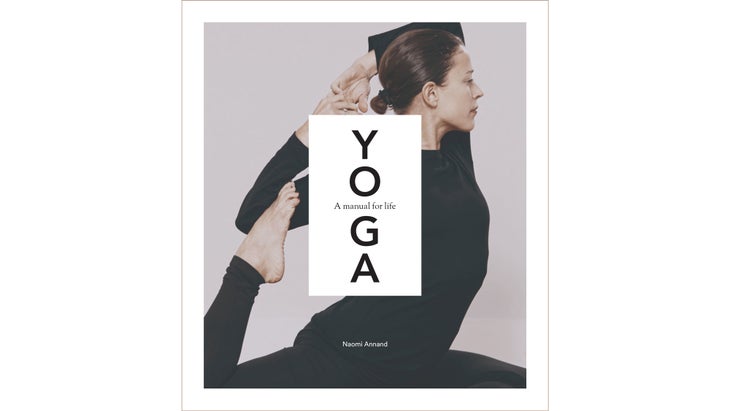
The sequence of poses was excerpted from Yoga: A Manual for Life by Naomi Annand. Reprinted in arrangement with Bloomsbury Sport. This article has been updated. Originally published January 30, 2020.
